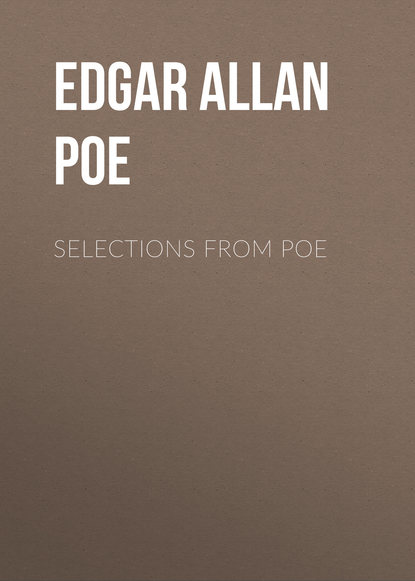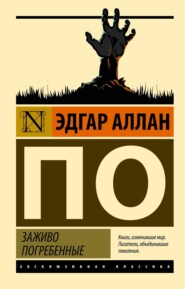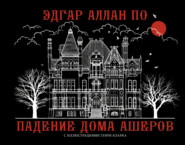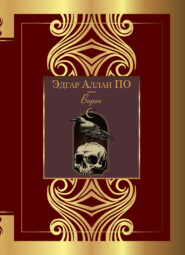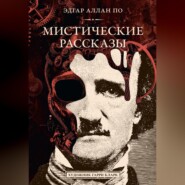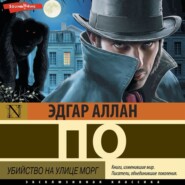По всем вопросам обращайтесь на: info@litportal.ru
(©) 2003-2025.
✖
Selections from Poe
Настройки чтения
Размер шрифта
Высота строк
Поля
It was toward the close of the fifth or sixth month of his seclusion, and while the pestilence raged most furiously abroad, that the Prince Prospero entertained his thousand friends at a masked ball of the most unusual magnificence.
It was a voluptuous scene, that masquerade. But first let me tell of the rooms in which it was held. There were seven – an imperial suite. In many palaces, however, such suites form a long and straight vista, while the folding-doors slide back nearly to the walls on either hand, so that the view of the whole extent is scarcely impeded. Here the case was very different, as might have been expected from the Prince's love of the bizarre. The apartments were so irregularly disposed that the vision embraced but little more than one at a time. There was a sharp turn at every twenty or thirty yards, and at each turn a novel effect. To the right and left, in the middle of each wall, a tall and narrow Gothic window looked out upon a closed corridor which pursued the windings of the suite. These windows were of stained glass, whose color varied in accordance with the prevailing hue of the decorations of the chamber into which it opened. That at the eastern extremity was hung, for example, in blue – and vividly blue were its windows. The second chamber was purple in its ornaments and tapestries, and here the panes were purple. The third was green throughout, and so were the casements. The fourth was furnished and lighted with orange, the fifth with white, the sixth with violet. The seventh apartment was closely shrouded in black velvet tapestries that hung all over the ceiling and down the walls, falling in heavy folds upon a carpet of the same material and hue. But, in this chamber only, the color of the windows failed to correspond with the decorations. The panes here were scarlet – a deep blood-color. Now in no one of the seven apartments was there any lamp or candelabrum, amid the profusion of golden ornaments that lay scattered to and fro or depended from the roof. There was no light of any kind emanating from lamp or candle within the suite of chambers. But in the corridors that followed the suite there stood, opposite to each window, a heavy tripod, bearing a brazier of fire, that projected its rays through the tinted glass and so glaringly illumined the room. And thus were produced a multitude of gaudy and fantastic appearances. But in the western or black chamber the effect of the firelight that streamed upon the dark hangings through the blood-tinted panes was ghastly in the extreme, and produced so wild a look upon the countenances of those who entered that there were few of the company bold enough to set foot within its precincts at all.
It was in this apartment, also, that there stood against the western wall a gigantic clock of ebony. Its pendulum swung to and fro with a dull, heavy, monotonous clang; and when the minute-hand made the circuit of the face, and the hour was to be stricken, there came from the brazen lungs of the clock a sounct which was clear and loud and deep and exceedingly musical, but of so peculiars note and emphasis that, at each lapse of an hour, the musicians of the orchestra were constrained to pause, momentarily, in their performance, to hearken to the sound; and thus the waltzers perforce ceased their evolutions; and there was a brief disconcert of the whole gay company; and, while the chimes of the clock yet rang, it was observed that the giddiest grew pale, and the more aged and sedate passed their hands over their brows as if in confused revery or meditation. But when the echoes had fully ceased, a light laughter at once pervaded the assembly; the musicians looked at each other and smiled as if at their own nervousness and folly, and made whispering vows, each to the other, that the next chiming of the clock should produce in them no similar emotion; and then, after the lapse of sixty minutes (which embrace three thousand and six hundred seconds of the Time that flies) there came yet another chiming of the clock, and then were the same disconcert and tremulousness and meditation as before.
But, in spite of these things, it was a gay and magnificent revel. The tastes of the Prince were peculiar. He had a fine eye for colors and effects. He disregarded the decora of mere fashion. His plans were bold and fiery, and his conceptions glowed with barbaric lustre. There are some who would have thought him mad. His followers felt that he was not. It was necessary to hear and see and touch him to be sure that he was not.
He had directed, in great part, the movable embellishments of the seven chambers, upon occasion of this great fête; and it was his own guiding taste which had given character to the masqueraders. Be sure they were grotesque. There were much glare and glitter and piquancy and phantasm – much of what has been since seen in Hernani. There were arabesque figures with unsuited limbs and appointments. There were delirious fancies such as the madman fashions. There was much of the beautiful, much of the wanton, much of the bizarre, something of the terrible, and not a little of that which might have excited disgust. To and fro in the seven chambers there stalked, in fact, a multitude of dreams. And these – the dreams – writhed in and about, taking hue from the rooms, and causing the wild music of the orchestra to seem as the echo of their steps. And, anon, there strikes the ebony clock which stands in the hall of the velvet. And then, for a moment, all is still, and all is silent save the voice of the clock. The dreams are stiff-frozen as they stand. But the echoes of the chime die away – they have endured but an instant – and a light, half-subdued laughter floats after them as they depart. And now again the music swells, and the dreams live, and writhe to and fro more merrily than ever, taking hue from the many tinted windows through which stream the rays from the tripods. But to the chamber which lies most westwardly of the seven, there are now none of the maskers who venture; for the night is waning away, and there flows a ruddier light through the blood-colored panes; and the blackness of the sable drapery appalls; and to him whose foot falls upon the sable carpet, there comes from the near clock of ebony a muffled peal more solemnly emphatic than any which reaches their ears who indulge in the more remote gayeties of the other apartments.
But these other apartments were densely crowded, and in them beat feverishly the heart of life. And the revel went whirlingly on, until at length there commenced the sounding of midnight upon the clock. And then the music ceased, as I have told; and the evolutions of the waltzers were quieted; and there was an uneasy cessation of all things as before. But now there were twelve strokes to be sounded by the bell of the clock; and thus it happened, perhaps, that more of thought crept, with more of time, into the meditations of the thoughtful among those who revelled. And thus too it happened, perhaps, that before the last echoes of the last chime had utterly sunk into silence, there were many individuals in the crowd who had found leisure to become aware of the presence of a masked figure which had arrested the attention of no single individual before. And the rumor of this new presence having spread itself whisperingly around, there arose at length from the whole company a buzz, or murmur, expressive of disapprobation and surprise – then, finally, of terror, of horror, and of disgust.
In an assembly of phantasms such as I have painted, it may well be supposed that no ordinary appearance could have excited such sensation. In truth the masquerade license of the night was nearly unlimited; but the figure in question had out-Heroded Herod, and gone beyond the bounds of even the Prince's indefinite decorum. There are chords in the hearts of the most reckless which cannot be touched without emotion. Even with the utterly lost, to whom life and death are equally jests, there are matters of which no jest can be made. The whole company, indeed, seemed now deeply to feel that in the costume and bearing of the stranger neither wit nor propriety existed. The figure was tall and gaunt, and shrouded from head to foot in the habiliments of the grave. The mask which concealed the visage was made so nearly to resemble the countenance of a stiffened corpse that the closest scrutiny must have had difficulty in detecting the cheat. And yet all this might have been endured, if not approved, by the mad revellers around. But the mummer had gone so far as to assume the type of the Red Death. His vesture was dabbled in blood– and his broad brow, with all the features of the face, was besprinkled with the scarlet horror.
When the eyes of Prince Prospero fell upon this spectral image (which with a slow and solemn movement, as if more fully to sustain its role, stalked to and fro among the waltzers) he was seen to be convulsed, in the first moment, with a strong shudder either of terror or distaste; but, in the next, his brow reddened with rage.
"Who dares?" he demanded hoarsely of the courtiers who stood near him – "who dares insult us with this blasphemous mockery? Seize him and unmask him – that we may know whom we have to hang at sunrise, from the battlements!"
It was in the eastern or blue chamber in which stood the Prince Prospero as he uttered these words. They rang throughout the seven rooms loudly and clearly – for the Prince was a bold and robust man, and the music had become hushed at the waving of his hand.
It was in the blue room where stood the Prince, with a group of pale courtiers by his side. At first, as he spoke, there was a slight rushing movement of this group in the direction of the intruder, who at the moment was also near at hand, and now, with deliberate and stately step, made closer approach to the speaker. But from a certain nameless awe with which the mad assumptions of the mummer had inspired the whole party, there were found none who put forth hand to seize him; so that, unimpeded, he passed within a yard of the Prince's person; and, while the vast assembly, as if with one impulse, shrank from the centres of the rooms to the walls, he made his way uninterruptedly, but with the same solemn and measured step which had distinguished him from the first, through the blue chamber to the purple – through the purple to the green – through the green to the orange – through this again to the white – and even thence to the violet, ere a decided movement had been made to arrest him. It was then, however, that the Prince Prospero, maddening with rage and the shame of his own momentary cowardice, rushed hurriedly through the six chambers, while none followed him on account of a deadly terror that had seized upon all. He bore aloft a drawn dagger, and had approached, in rapid impetuosity, to within three or four feet of the retreating figure, when the latter, having attained the extremity of the velvet apartment, turned suddenly and confronted his pursuer. There was a sharp cry – and the dagger dropped gleaming upon the sable carpet, upon which, instantly afterwards, fell prostrate in death the Prince Prospero. Then, summoning the wild courage of despair, a throng of the revellers at once threw themselves into the black apartment, and, seizing the mummer, whose tall figure stood erect and motionless within the shadow of the ebony clock, gasped in unutterable horror at finding the grave cerements and corpse-like mask, which they handled with so violent a rudeness, untenanted by any tangible form.
And now was acknowledged the presence of the Red Death. He had come like a thief in the night. And one by one dropped the revellers in the blood-bedewed halls of their revel, and died each in the despairing posture of his fall. And the life of the ebony clock went out with that of the last of the gay. And the flames of the tripods expired. And Darkness and Decay and the Red Death held illimitable dominion over all.
THE GOLD BUG
What ho! what ho! this fellow is dancing mad!
He hath been bitten by the Tarantula.
All in the Wrong
Many years ago, I contracted an intimacy with a Mr. William Legrand. He was of an ancient Huguenot family, and had once been wealthy; but a series of misfortunes had reduced him to want. To avoid the mortification consequent upon his disasters, he left New Orleans, the city of his fore-fathers, and took up his residence at Sullivan's Island, near Charleston, South Carolina.
This island is a very singular one. It consists of little else than the sea sand, and is about three miles long. Its breadth at no point exceeds a quarter of a mile. It is separated from the mainland by a scarcely perceptible creek, oozing its way through a wilderness of reeds and slime, a favorite resort of the marsh-hen. The vegetation, as might be supposed, is scant, or at least dwarfish. No trees of any magnitude are to be seen. Near the western extremity, where Fort Moultrie stands, and where are some miserable frame buildings, tenanted during summer by the fugitives from Charleston dust and fever, may be found, indeed, the bristly palmetto; but the whole island, with the exception of this western point, and a line of hard white beach on the seacoast, is covered with a dense undergrowth of the sweet myrtle, so much prized by the horticulturists of England. The shrub here often attains the height of fifteen or twenty feet, and forms an almost impenetrable coppice, burdening the air with its fragrance.
In the utmost recesses of this coppice, not far from the eastern or more remote end of the island, Legrand had built himself a small hut, which he occupied when I first, by mere accident, made his acquaintance. This soon ripened into, friendship – for there was much in the recluse to excite interest and esteem. I found him well educated, with unusual powers of mind, but infected with misanthropy, and subject to perverse moods of alternate enthusiasm and melancholy. He had with him many books, but rarely employed them. His chief amusements were gunning and fishing, or sauntering along the beach and through the myrtles in quest of shells or entomological specimens; – his collection of the latter might have been envied by a Swammerdamm. In these excursions he was usually accompanied by an old negro, called Jupiter, who had been manumitted before the reverses of the family, but who could be induced, neither by threats nor by promises, to abandon what he considered his right of attendance upon the footsteps of his young "Massa Will." It is not improbable that the relatives of Legrand, conceiving him to be somewhat unsettled in intellect, had contrived to instil this obstinacy into Jupiter, with a view to the supervision and guardianship of the wanderer.
The winters in the latitude of Sullivan's Island are seldom very severe, and in the fall of the year it is a rare event indeed when a fire is considered necessary. About the middle of October, 18 – , there occurred, however, a day of remarkable chilliness. Just before sunset I scrambled my way through the evergreens to the hut of my friend, whom I had not visited for several weeks – my residence being at that time in Charleston, a distance of nine miles from the island, while the facilities of passage and re-passage were very far behind those of the present day. Upon reaching the hut I rapped, as was my custom, and, getting no reply, sought for the key where I knew it was secreted, unlocked the door and went in. A fine fire was blazing upon the hearth. It was a novelty, and by no means an ungrateful one. I threw off an overcoat, took an armchair by the crackling logs, and awaited patiently the arrival of my hosts.
Soon after dark they arrived, and gave me a most cordial welcome. Jupiter, grinning from ear to ear, bustled about to prepare some marsh-hens for supper. Legrand was in one of his fits – how else shall I term them? – of enthusiasm. He had found an unknown bivalve, forming a new genus, and, more than this, he had hunted down and secured, with Jupiter's assistance, a scarabæus which he believed to be totally new, but in respect to which he wished to have my opinion on the morrow.
"And why not to-night?" I asked, rubbing my hands over the blaze, and wishing the whole tribe of scarabæi at the devil.
"Ah, if I had only known you were here!" said Legrand, "but it's so long since I saw you; and how could I foresee that you would pay me a visit this very night of all others? As I was coming home I met Lieutenant G – , from the fort, and, very foolishly, I lent him the bug; so it will be impossible for you to see it until the morning. Stay here to-night, and I will send Jup down for it at sunrise. It is the loveliest thing in creation!"
"What? – sunrise?"
"Nonsense! no! – the bug. It is of a brilliant gold color – about the size of a large hickory-nut – with two jet black spots near one extremity of the back, and another, somewhat longer, at the other. The antennæ are – "
"Dey aint no tin in him, Massa Will, I keep a tellin on you," here interrupted Jupiter; "de bug is a goole-bug, solid, ebery bit of him, inside and all, sep him wing – neber-feel half so hebby a bug in my life."
"Well, suppose it is, Jup," replied Legrand, somewhat more earnestly, it seemed to me, than the case demanded, "is that any reason for your letting the birds burn? The color" – here he turned to me – "is really almost enough to warrant Jupiter's idea. You never saw a more brilliant metallic lustre than the scales emit – but of this you cannot judge till to-morrow. In the meantime I can give you some idea of the shape." Saying this, he seated himself at a small table, on which were a pen and ink, but no paper. He looked for some in a drawer, but found none.
"Never mind," said he at length, "this will answer;" and he drew from his waistcoat pocket a scrap of what I took to be very dirty foolscap, and made upon it a rough drawing with the pen. While he did this, I retained my seat by the fire, for I was still chilly. When the design was complete, he handed it to me without rising. As I received it, a low growl was heard, succeeded by a scratching at the door. Jupiter opened it, and a large Newfoundland, belonging to Legrand, rushed in, leaped upon my shoulders, and loaded me with caresses; for I had shown him much attention during previous visits. When his gambols were over, I looked at the paper, and, to speak the truth, found myself not a little puzzled at what my friend had depicted.
"Well!" I said, after contemplating it for some minutes, "this is a strange scarabæus, I must confess; new to me: never saw anything like it before – unless it was a skull, or a death's-head, which it more nearly resembles than anything else that has come under my observation."
"A death's-head!" echoed Legrand – "oh – yes – well, it has something of that appearance upon paper, no doubt. The two upper black spots look like eyes, eh? and the longer one at the bottom like a mouth – and then the shape of the whole is oval."
"Perhaps so," said I; "but, Legrand, I fear you are no artist. I must wait until I see the beetle itself, if I am to form any idea of its personal appearance."
"We'll, I don't know," said he, a little nettled, "I draw tolerably —should do it at least – have had good masters, and flatter myself that I am not quite a blockhead."
"But, my dear fellow, you are joking then," said I; "this is a very passable skull, – indeed, I may say that it is a very excellent skull, according to the vulgar notions about such specimens of physiology – and your scarabæus must be the queerest scarabæus in the world if it resembles it. Why, we may get up a very thrilling bit of superstition upon this hint. I presume you will call the bug scarabæus caput hominis, or something of that kind – there are many similar titles in the Natural Histories. But where are the antennae you spoke of?" "The antennae!" said Legrand, who seemed to be getting unaccountably warm upon the subject; "I am sure you must see the antennae. I made them as distinct as they are in the original insect, and I presume that is sufficient."
"Well, well," I said, "perhaps you have – still I don't see them;" and I handed him the paper without additional remark, not wishing to ruffle his temper, but I was much surprised at the turn affairs had taken; his ill humor puzzled me – and as for the drawing of the beetle, there were positively no antennae visible, and the whole did bear a very close resemblance to the ordinary cuts of a death's-head.
He received the paper very peevishly, and was about to crumple it, apparently to throw it in the fire, when a casual glance at the design seemed suddenly to rivet his attention. In an instant his face grew violently red – in another as excessively pale. For some minutes he continued to scrutinize the drawing minutely where he sat. At length he arose, took a candle from the table, and proceeded to seat himself upon a sea-chest in the farthest corner of the room. Here again he made an anxious examination of the paper; turning it in all directions. He said nothing, however, and his conduct greatly astonished me; yet I thought it prudent not to exacerbate the growing moodiness of his temper by any comment. Presently he took from his coat pocket a wallet, placed the paper carefully in it, and deposited both in a writing-desk, which he locked. He now grew more composed in his demeanor; but his original air of enthusiasm had quite disappeared. Yet he seemed not so much sulky as abstracted. As the evening wore away he became more and more absorbed in revery, from which no sallies of mine could arouse him. It had been my intention to pass the night at the hut, as I had frequently done before, but, seeing my host in this mood, I deemed it proper to take leave. He did not press me to remain, but, as I departed, he shook my hand with even more than his usual cordiality.
It was about a month after this (and during the interval I had seen nothing of Legrand) when I received a visit, at Charleston, from his man, Jupiter. I had never seen the good old negro look so dispirited, and I feared that some serious disaster had befallen my friend.
"Well, Jup," said I, "what is the matter now? – how is your master?"
"Why, to speak de troof, massa, him not so berry well as mought be."
"Not well! I am truly sorry to hear it. What does he complain of?"
"Dar! dat's it! – him neber plain of notin – but him berry sick for all dat."
"Very sick, Jupiter! – why didn't you say so at once? Is he confined to bed?"
"No, dat he aint! – he aint find nowhar – dat's just whar de shoe pinch – my mind is got to be berry hebby bout poor Massa Will."
"Jupiter, I should like to understand what it is you are talking about. You say your master is sick. Hasn't he told you what ails him?"
"Why, massa, taint worf while for to git mad bout de matter – Massa Will say noffin at all aint de matter wid him – but den what make him go about looking dis here way, wid he head down and he soldiers up, and as white as a gose? And den he keep a syphon all de time – "
"Keeps a what, Jupiter?"
"Keeps a syphon wid de figgurs on de slate – de queerest figgurs I ebber did see. Ise gittin to be skeered, I tell you. Hab for to keep mighty tight eye pon him noovers. Todder day he gib me slip fore de sun up and was gone de whole ob de blessed day. I had a big stick ready cut for to gib him d – d good beating when he did come – but Ise sich a fool dat I hadn't de heart arter all – he look so berry poorly."
"Eh? – what? – ah yes! – upon the whole I think you had better not be too severe with the poor fellow – don't flog him, Jupiter – he can't very well stand it – but can you form no idea of what has occasioned this illness, or rather this change of conduct? Has anything unpleasant happened since I saw you?"
"No, massa, dey aint bin noffin onpleasant since den – it 'twas fore den I'm feared – 'twas de berry day you was dare."
"How? what do you mean?"
"Why, massa, I mean de bug – dare now."





